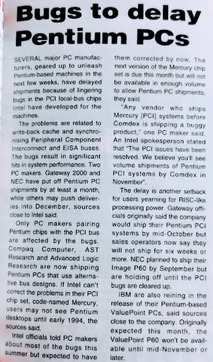I figured that it would be a good idea to follow-up on my previous posts with an update on the machine. I'm still not 100% there, but a lot closer.
I did indeed verify that there were no IRQ conflicts and came to the conclusion that as this machine has date codes for November 1993, I likely have a very early version of the Mercury chipset that is buggy as anything. Attached is an article from October 1993 detailing how Gateway were one of the few manufacturers that were shipping Pentium systems with a PCI bus the following month, with other manufacturers holding off due to the litany of issues with the PCI chipset. Experience is the better part of valour, and as such I have given up on my quest to install a superior IDE controller card (it is almost certainly the reason Gateway stuck to a single ISA based IDE channel).
The system did come to me with an Adaptec 2940 and a simply enormous 2GB hard drive from 1995. I presume this upgrade was installed during that year, but I did not fancy using a noisy, double height 5.25" hard drive that might fail at any moment. So I gambled a little and bought a ZuluSCSI being marketed for Amigas' at a reasonable price. The gamble has certainly paid off, with a little trial and error resulting in a 16GB SDCard acting as 3 hard drives within the machine (SYSTEM, DOCUMENTS & SETUP).
So why am I not 100% there?
Performance is fine but I have two problems - one being a rather nice problem to have and the other needing a degree of patience to resolve.
The nice problem is what soundcard to use. This is a case of having plenty of excellent choices rather than any issues. Although this is not intended to be a gaming computer, I certainly want the option and to have good sound when I do. I can use a Sound Blaster AWE64 Gold, an unbranded CMI8728 card with Dream MIDI chip onboard, I have a MK8330 with e-wave MIDI add-on on its way from Greece as we speak, and I can also do a little sound card shuffle, so potentially switch to a Sound Blaster 16 or a number of other cards with OPL3.
I have tried the AWE64 previously but I think it is a bit of a heavy option for the system. The CMI8728 with Dream is a lovely card, but with no official Windows 95 drivers and issues with the ones that it does use, I would prefer to use this in a Windows 3.x machine. I am building a 386DX machine very soon and I reckon it would be perfect in there. The MK8330 is a harder choice. I could put it in my 486 which I only pull out from time to time when I get the chance, or install it in this which I will use quite frequently because it is in my KVM stack. Buuuut.... the 486 is a dedicated DOS gaming computer and this is a legacy photo extraction and editing computer with occasional gaming chops. Frankly, having this sort of problem is a delight, as it means I have a lot of choice and truly I am spoiled.
The other issue is networking. I have a dedicated VLAN for my legacy network with network shares available to access program installers, drivers etc. Unfortunately when transferring large files, the computer often freezes. I strongly suspect a software issue, with some indications linking the unofficial service pack 1 as a culprit. I have switched from PCI 10/100 network cards to 10Mb and currently ISA 10Mb network cards, but all have been 3Com, so it could also be a driver issue. I am confident that somewhere I will find a solution, I'm just not there yet.
I will post a further update a little later on, but to conclude, storage issues appear to be resolved through the power of giving up and spending more money. I have more work to do on the computer, but hope very soon to have a functioning early model Pentium to which I can connect my early 90's digital cameras and occasionally play the odd DOS game.
Side note: I would have thought these early network cards don't use FPU calculations, but could the patches mean that they start to? My CPU definitely has the FDIV bug and that would explain the lock-ups.
